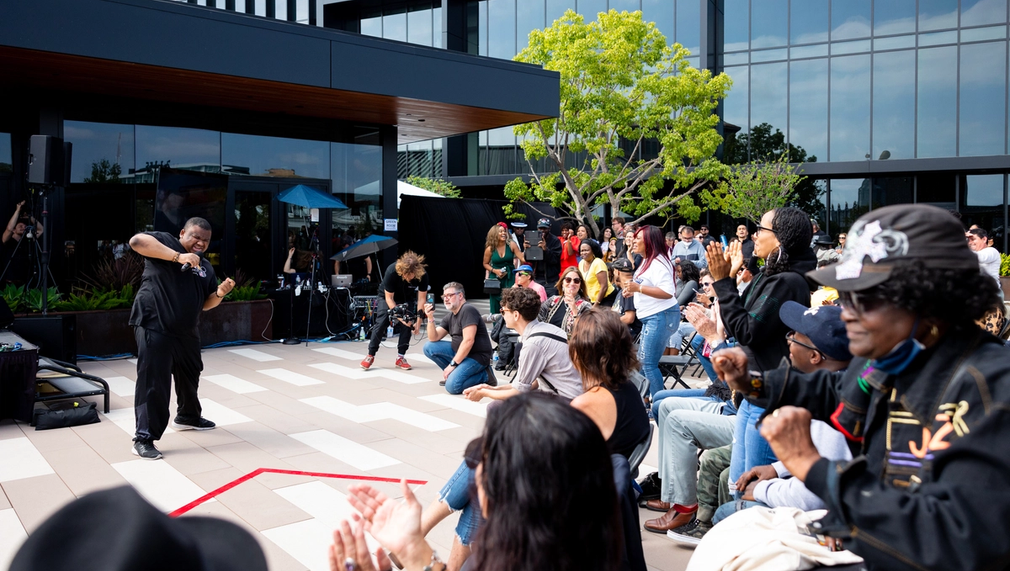Disability Inclusion in the Music Industry
JHFA uses music as a vehicle to create change and break down barriers that have historically prevented adults with autism spectrum disorder (ASD) from gaining meaningful employment. This grant will help codify postsecondary curricula for ASD adults in four music-related career tracks: 1. performance, 2, composition, 3. music administration, and 4. teaching/ pedagogy. To supplement this curriculum, JHFA will offer related experiential career support through placement in internships, paid employment, and advocacy.

What is the primary issue area that your application will impact?
Access to Creative Industry Employment (sponsored by Snap Foundation)
In which areas of Los Angeles will you be directly working?
County of Los Angeles
In what stage of innovation is this project, program, or initiative?
Expand existing project, program, or initiative
What is your understanding of the issue that you are seeking to address?
An estimated 5.4 MILLION adults in the US have ASD. The CDC estimates CA is home to the largest population (701,669). Knowing that LA comprises 25% of CA’s population (2021 census), we estimate there are over 175,000 Angelenos with ASD. This population is growing. Each year, 50,000 teenagers with ASD across the nation turn 18 and age out of school-based services. Upon leaving school, there are few services available - ¼ receive no postsecondary services. Adults with ASD struggle with social interactions, making employment difficult. This renders over 90% unemployed or underemployed. Lack of employment leads to loneliness - adults with ASD are 4X more likely to experience loneliness than neurotypical adults. This means 10% or less of adults with ASD have a financially stable, meaningful life. COVID-19 has led to more unemployment and social isolation in the ASD and neurotypical community. Reflecting on how JHFA changed their life, one student said, “without JHFA I feel lonely.”
Describe the project, program, or initiative this grant will support to address the issue.
JHFA has served the ASD community since 2014. A grant from LA2050 will enhance our model by codifying our curriculum and aligning experiential learning opportunities in four career tracks. While other vocational programs focus on menial tasks, we use music as a vehicle for change. Music therapy is well-established as effective for children with ASD. The engaging nature/accessibility elicits positive responses and research has found advanced music memory/aptitude in the population. No other organization uses music for vocational services. This project will help participants develop musical skills as well as transferable professional and social skills. 1. Develop the JHFA curriculum. Stage 1 addresses music-industry knowledge. Stage 2 focuses on four career tacks: 1. performance, 2, composition, 3. music administration, and 4. teaching. Electives include Teacher Training, Digital Marketing, and Music Software (Audio Recording, Engineering, Music Production). Courses will be offered digitally through the online platform Moodle and in-person. 2. Internships. JHFA will partner with a variety of local organizations to deliver aligned internships for each career track (Kayne Eras Center, Music is Unity, and the Cities of Pasadena and Culver City). Each musician will receive one-on-one job coaching. 3. Digital music library. JHFA will promote the first music library of songs by artists with ASD, helping them earn passive income while building the social skills for in-person work.
Describe how Los Angeles County will be different if your work is successful.
We envision a future where adults with ASD contribute to the LA community. Goal 1: Help artists with ASD secure employment -100% will secure at least one paid gig every 3 months -Increase the # of jobs secured -Increase in each musician’s asking wage Goal 2: Musicians will master soft skills (professional development, conflict management, networking) -100% will complete their career map -95% will complete a professional portfolio (resume, CV, repertoire list, and pitch email) - 90% employer satisfaction based on employer survey Goal 3: Instill confidence in social skills -100% will increase their social skills (eye contact, communication) based on report cards -75% will report positive emotions based on quarterly surveys In the long term, this grant will transform LA by 1. creating careers for artists with ASD, 2. promoting inclusion in the music industry, 3. fostering relationships between adults with ASD and the community, and 4. changing the way adults with ASD are taught.
What evidence do you have that this project, program, or initiative is or will be successful, and how will you define and measure success?
JHFA effectively promotes music industry career opportunities for adults with ASD. To date, JHFA helped over 200 musicians with ASD complete over 180+ gigs, 75% of which were paid. Our impact continues to grow. Between 2020 and 2021, there was a 21% increase in the number of work opportunities. Additionally, there was a 125% increase in earnings. This program improves the lives of adults with ASD. One student commented, “JHFA has enriched my life for the better. It has given me the opportunity to express myself and opened doors for me to meet new people.” Another student commented that “JHFA helps me connect with the world.” Building on this success, JHFA will track the progress of the aforementioned goals. We use a combination of pre/ post-tests, teacher surveys (compiled into monthly reports and report cards every trimester), self-reported outcomes, audience reports, and employer surveys. JHFA employs a full-time Operations Director and part-time Analyst to track key metrics.
Approximately how many people will be impacted by this project, program, or initiative?
Direct Impact: 30
Indirect Impact: 70